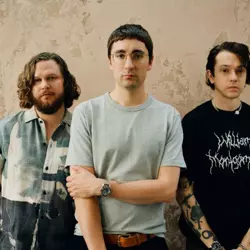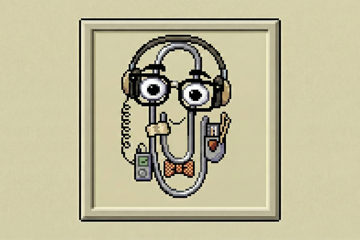 alt-J
alt-JSince alt-J first toured our shores back in 2012, Australia has held a special place in their hearts. So much so that U&ME – the sunkissed, celebratory lead single from their fourth album The Dream – is a story set at a music festival, which was inspired by lead vocalist/guitarist Joe Newman living it up at Melbourne’s Sun Cycle festival with his partner, Australian dancer/choreographer Darcy Wallace.
Directed by alt-J keyboardist Gus Unger-Hamilton's brother Prosper, U&ME’s accompanying music video is the first to feature all three of the band’s members.
Of his band’s affinity for Australia, Newman explains, “None of us had been to Australia before touring the first album [2012’s An Awesome Wave] and, I mean, Australia is like the promised land, isn’t it? It’s the country you think that you’ll go to at some point, but you just don’t know how or when. And travelling to Australia with alt-J was sort of unexpected, but equally it was just magnificent and, yeah! I think it was one of the first areas outside of Europe that we travelled to and, you know, we fell in love with it, I started dating an Australian and the rest is history!”
Newman actually spent last Christmas in Melbourne with his partner’s family. “We all met at the airport and it was really quite emotional,” Newman recalls of finally being able to introduce his baby daughter to her maternal relatives, in the flesh, almost a year after she was born. “Melbourne is not even like my second home, it’s just my other home,” he continues. “I love it in Melbourne. I love Australia, I love Australians and it’s now part of my daughter’s blood, so...”
Don't miss a beat with our FREE daily newsletter
Late last year, alt-J dropped The Dream’s second single, Get Better. Described by Newman as “emotionally the most honest song I’ve written”, Get Better is a stripped-back acoustic ballad that could not be further removed from U&ME’s upbeat vibe. Even though the events Newman describes throughout Get Better are fictional, listening to this song, which includes a lyrical tribute to frontline workers, within the context of a global pandemic is bound to give you goosebumps: “I’ll start the day with tiramisu / Raise a spoon to frontline workers / An underfunded principle / They risk all to be there for us.”
And tiramisu isn’t the only delectable treat that Newman immortalises in Get Better. When he thought to rhyme “Nutella” with “cellar” (“Your Nutella, I'll keep it in the cellar...”), we’re tipping Newman patted himself on the back. “I was very, very proud of that, lyrically speaking. That was the pinnacle of my career as a lyricist,” he allows, chuckling. Was there a rhyming dictionary involved? “No, but I have used thesauruses at times,” he admits. “Sometimes you want to know whether the word that you’re using actually makes sense within the context, so you check it out. And then you’re like, ‘Hmmm, I think I’m just gonna look at the variations on this word,’ and then things change. A thesaurus is key – that’s part of your survival pack if you’re writing songs, I think… You know all the words, but you just can’t recall them when you need to. Using a thesaurus is not a cheat. You think it is, but it’s not.”
Alt-J’s irresistibly boppy latest single Hard Drive Gold draws from a poppier sonic palette and also features a choir. A slightly tongue-in-cheek song about a schoolboy who becomes an overnight cryptocurrency millionaire, Hard Drive Gold cements Newman’s rep as a master composer of character-driven songs. “It’s quite a satisfying process, weaving historical events into fictitious stories,” Newman reveals. “It confuses your audience and I think that’s actually quite a good thing to do, because it leaves a lot of mystery in the music.”
Also on The Dream: Happier When You’re Gone is about a woman killing her abusive partner, then burning the body and The Actor transports us to John Belushi’s drug-related death scene at LA’s Chateau Marmont hotel in 1982.
“I think for The Actor, time enabled that song... Originally it was this guitar riff and I sort of just followed it with a cool melody and then eventually I was like, ‘Oh, what can this be about?’ And originally it was about some kind of happening at a party, which involved a gunfight, and then over time I realised, ‘Well, maybe I need to tell a story about some struggling actor who is kind of subsidising their dream by being a drug dealer.’ And then I was just like, ‘John Belushi!’”
So which album track was written the longest time ago? “Well, we have a song called Happier When You’re Gone and the main riff from that was actually a bass riff from 2007. That was originally a song called I’m A Robber From The ‘70s, but we never recorded it and so it existed only in our memory. But I always remember that bass riff, because it’s really catchy and on the bass I always thought it had this, like, Joy Division vibe. And originally we wanted to play it on the bass to sort of honour the origin of the song, but then I suppose it just organically grew out of that and turned into a guitar riff but, yeah! That was a really old song and so it’s nice that it was kind of reborn.”
Although alt-J songs “normally start from guitar”, Newman acknowledges, “It’s funny, because each song is slightly different in terms of the order in which things arrive. But I think, largely, you’re on a journey of discovery. Like, for example, Happier When You’re Gone and Bane are just songs that existed from another time that I sort of combined over periods of time and then I’ve sewn them together. But then you have songs like Walk A Mile or Philadelphia that were just jams in my head – on my own – that I kept returning to.”
There’s no better example of alt-J’s genre fluidity than Walk A Mile, which incorporates barbershop-quartet harmonies. It turns out Unger-Hamilton was actually in a barbershop group at King’s Ely school, which is something he hadn’t shared with his fellow alt-J members until they were working on that particular song. “I was like, ‘I think this would sound cool with, like, a barbershop-style harmony set-up,’ and Gus was like, ‘Oh, I was in a barbershop.’ I was kind of like, ‘Yeah? You kept that quiet,’ and, yeah! He was just like, ‘Yeah, we did two tours of Thailand,’ and I was just like, ‘Fuck’s sake, okay’,” he recounts, laughing. “So I left it in his capable hands. I believe it’s five [parts] – it’s me singing the lead, and him and actually his friends from the [original] barbershop group sang on it. So it was a nice opportunity for him to reconnect with people that he hadn’t seen for a long time. And I think they all went to the pub afterwards.”
Had alt-J announced their new album would contain a barbershop-inspired number, you could be forgiven for thinking they were taking the piss, right? But it works! “I think it works, yeah,” Newman agrees. “It’s one of those things where if you look at it all on a transcript – like, the genres and styles of what we do – it’s gonna be odd to read. But if you like what we do, and you get used to what we’re doing on this album, then it’ll just become something that you look forward to listening to.
“I think [The Dream’s songs] span so many different periods of time, so it kind of comes across as quite eclectic. But that’s not to say we’re sort of striving to create a world of different genres; I suppose we just react to the songs as they come and it kind of comes across as we’re, like, hopping genres.”
Given that Breezeblocks was such a massive hit – voted in at #12 in triple j’s Hottest 100 Of The Decade last year – we can’t help but wonder whether releasing such a well-received song so early on in your career is a bit of a poison chalice due to the weight of expectation that follows. “It doesn’t feel like a weight of expectation,” Newman ponders. “I mean, I think with us you can be safe in knowing that you won’t know what we’re doing until we do it. And so I think, because of that, it’s sort of like a testament to how we write. We really enjoy writing new material and who knows? There may be another Breezeblocks, but it’s not something that we think about too much.
“I remember writing that song in 2009 and it was just like every other song that we were writing; we were just really excited about it, but then we were also really excited about all the other material – most of which went on the first album. [The success of Breezeblocks] wasn’t a surprise; it was just interesting that that song caught the mood of the world and the fans we played to. I don’t think we’re trying to emulate that. You don’t want to break down what that song was and then create a formula from that song, I think that’s when your music becomes more of a commercial endeavour rather than one that’s more cerebral and instinctive.”
You can’t mess with the magic when it comes to songwriting, right? “You can’t! You’ve just gotta go with it,” Newman concurs. “Go with the current, let it take you out and then start swimming. I learnt in Australia that you don’t fight the current, you let it take you out and then you start swimming to the side. Is that right?” he queries, laughing. When we suggest Newman probably could’ve garnered that kind of info just from watching Bondi Rescue, he shares, “It’s funny, actually. [Bondi Rescue] was on when I was isolating after coming off the flight and I was just like, ‘The sea is dangerous!” You can’t mess with the ocean. “Nope, you cannot.”















